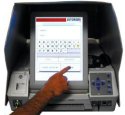Voting-machine firm sued for GPL violations
Nov 7, 2008 — by Eric Brown — from the LinuxDevices Archive — 4 views Yet another Linux device maker has been sued over alleged GPL violations. Diebold subsidiary PES allegedly used a GPL-licensed copy of the Ghostscript Postscript interpreter in its optical-scan voting machines, without abiding by the license's terms, claims Ghostscript copyright holder Artifex Software.
Yet another Linux device maker has been sued over alleged GPL violations. Diebold subsidiary PES allegedly used a GPL-licensed copy of the Ghostscript Postscript interpreter in its optical-scan voting machines, without abiding by the license's terms, claims Ghostscript copyright holder Artifex Software.
(Click for larger view of the PES AutoMark Voter Assist Terminal (VAT) optical-scan system)
Diebold and PES “have not been granted a license to modify, copy, or distribute any of Artifex's copyrighted works,” Artifex claimed in papers it filed last month in U.S. District Court for Northern California, according to InformationWeek. The San Rafael, Calif.-based Artifex is asking for monetary damages in excess of $150,000, says the story. The company also wants the court to impound PES optical-scan equipment, such as the AutoMark scanner (pictured above), that it says violates Artifex copyrights. PES optical scanning voting machines are widely used in state and federal elections, including this week's presidential contest, according to the PES website.
Ghostscript, currently available in version 8.63, is a Postscript and PDF interpreter that is offered for free under a GNU General Public License (GPL). It was likely used in PES systems to print paper voting records. The GPL license permits developers to study, modify, use, and redistribute Ghostscript. However, its copyleft requirements demand that any derivatives of the software must be made available under the same terms, something that Artifex alleges Diebold failed to do.
Diebold could have instead purchased a license for Artifex's commercial version of Ghostscript. According to an Ars Technica story on the case, HP, IBM, Kodak, Siemens, SGI, and Xerox have all purchased legal Ghostscript licenses from the company. The story points to a mailing list post by Ghostscript developer Ralph Giles, dating from last November, in which he raised questions about the use of Ghostscript in PES machines. The posting notes that PES uses the Windows 2000 version of Ghostscript, which also comes in a Linux version.
The Ars Technica story goes on to note that Diebold/PES voting machines have suffered from numerous security vulnerabilities, and that the company has been sued by the State of California for making fraudulent claims about its machines.
Tempting fate
Hacker projects and non-profit legal support groups have been increasingly vigilant in publicizing GPL violations and filing lawsuits against prominent violators. After GPL-Violations.org won several cases in Europe, including a successful suit against Skype, a similar U.S. group called the Software Freedom Law Center (SFLC) has racked up numerous settlements on behalf of the developers of BusyBox. Even Verizon settled with the SFLC.
The U.S. District Court for Northern California has yet to rule on the Artifex case, nor have there been formal responses files by Diebold, says the InformationWeek story. Artifex is said to be represented by San Franciso-based O'Melveny & Myers.
The InformationWeek story, by Paul McDougall, should be available here. Ryan Paul's Ars Technica story, meanwhile, should be here. Docket filing information for Artifex's U.S. District Court for Northern California suit can be found on the Justia page.
In related news, the Software Freedom Law Center in August published an 8,000-word guide to effective compliance with the GNU General Public License (GPL). Meanwhile, GPL-Violations.org has published a guide describing how to identify GPL- or LGPL-licensed open source software in embedded devices.
This article was originally published on LinuxDevices.com and has been donated to the open source community by QuinStreet Inc. Please visit LinuxToday.com for up-to-date news and articles about Linux and open source.